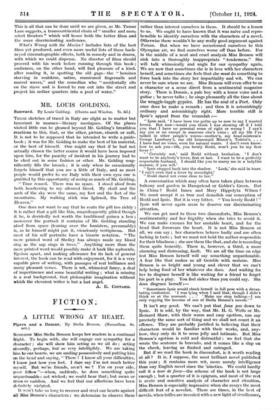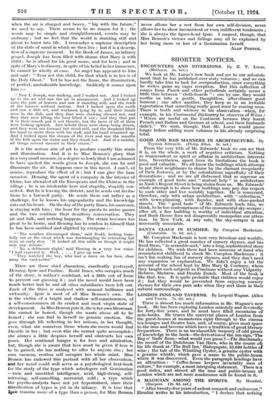FICTION:
A LITTLE WRONG AT -HEART.
SOMEHOW Miss Stella Benson keeps her readers in a continual sight. To begin with, she will engage our sympathy for a character; she will show him. acting as we all do ; acting absurdly, perhaps, but so very intelligibly. We are taking him to cmr hearts, we are smiling possessively- and patting him an the head and saying, " There ! I know all your difficulties,
know just hew you feel. I dare say- I'm not much better myself. But we're friends, aren't we ? I'm on your side, poor felk4 "—when, suddenly, he does something quite unpardonable: not wicked ; we could bear that ; but mean or crass or caddish. And we feel that our affections have been definitely viotext. - It won't take us long to recover and steel our hearts against all Miss Benson's elmracters : we determine to observe them
rather than interest ourselves in them. It should be a lesson to us. We ought to have known that it was naive and repre- hensible to identify ourselves with the characters of a novel. Otherwise there wouldn't be any really good argument against Tarzan. But when we have accustomed ourselves to this Olympian air, we find ourselves worse off than before. For in the middle of a neat and cruel analysis Miss Benson will sink into a thoroughly inappropriate ",tenderness." She will talk whimsically and angle for our sympathy again. We see now that sometimes she is in love with her characters herself, and sometimes she feels that she must do something to force back into the story her impartiality and wit. We can never be sure where we are. Miss Benson will even offer to us a character or a scene direct from a sentimental magazine story. There is Donnie, a pale boy with a tenor voice and a guitar ; he never talks ; he sings pleasantly all the time about the wraggle-taggle gypsies. He has the soul of a Poet. Only
once does he make a remark ; and then it is astonishingly ordinary and astonishingly right. More terrible still is Ipsie's appeal from the verandah :—
"Ipsie said, 'I have been too polite up to now to say I wanted lovers. But now—would you think I was showing off if I told you that I have no personal sense of right or wrong ? I can't say yes or no except in someone else's voice ; all my life I've talked in other people's voices—mother's, my head-mistress's George Lansbury's, our old housemaid Minnie's, Tolstoi's. . . I have had no voice, even for natural wants. I don't even know. how to ask you—Oh, you lovely Rodd, won't you be my first lover '
"'Certainly not,' said Rodd without hesitation. I don't want to be anybody's lover, first or last. I want to be a perfectly respectable husband. I should like you to marry me in a ladylike manner, if you will.'
"Ipsie stepped back into the shadow. Look,' she said in tears. I can't even find a lover by moonlight.' "Rodd dared not come close to her."
A conversation which may often have taken place between balcony and garden in Hampstead or Golder's Green. But in China ? Rodd lanes and Mary Hippolyta Wilson ? We must accept it as true and demolish our conception of Rodd and Ipsie. But it is very bitter. "You lovely Rodd ! " Ipsie will never again seem to deserve our discriminating attention.
We can get used to these two discomforts, Miss Benson's sentimentality and her frigidity when she tries to avoid it. We can make excuses for her unstable heart, and for the head that forswears the heart. It is not Miss Benson at all, we can say ; her characters behave badly and are often lacking in taste ; but we must not hold the author responsible for their blindness ; she saw them like that, and she is recording them quite honestly. There is, however, a third, a more alarming and distressing, fault. We are all the time on edge lest Miss Benson herself will say something unpardonable. A fear like that makes us all tremble with malaise. Miss Benson is so bright and young and clever that we can't help being fond of her whatever she does. And waiting for her to disgrace herself is like waiting for a friend to forget his part in a play. You feel sicker than you could say. She does disgrace herself Sometimes Ipsie would check herself in full pose with a devas- tating confession. I was lying when I said that, though I didn't think so at the moment. . . . Make me stop talking—I am only copying the heroine of one of Stella Benson's novels.'" It isn't any good. We can't put that faux pas down to Ipsie.. It is odd, by the way, that Mr. H. G. Wells or Mr. Bernard Shaw, with their warm and easy egotism, can say precisely the same sort of thing and we shall not count it an offence: They are probably justified in believing that their characters would be familiar with their works, and, any- how, they only do it to seem jolly and intimate. But Miss Benson's egotism is cold and distrustful : we feel that she wrote the sentence in bravado, and it comes like a slap on the cheek, leaving us flushed and outraged.
But if we read the book in discomfort, is it worth reading at all ? It is, I suppose, the most brilliant novel published this year ; it contains more wit, more unruly intelligence than any English novel since the 'nineties. We could hardly call it a lour de force—the scheme of the book is not large enough;, but A quarter of it is epigram, and most of the rest is acute and sensitive analysis of character and situation. Miss Benson is-especially impressive when she essays the most difficult feat of a novelist. There are times, in the best of novels, when trifles are invested with a new light of simificance,
when the air is charged and heavy, "big with the future," we used to say. There seems to be no reason for it ; the words may be simple and straightforward, events may be ordinary ; but we feel that the world is standing still and about to burst into life. I remember a supreme description of the state of mind in which we then live : but it is a descrip- tion of a supreme moment. In the Book of James, an infancy gospel, Joseph has been filled with shame that Mary is with child ; he is afraid for his good name, and for hers ; and in spite of Mary's testimony, in spite of his belief in her innocence, he cannot be wholly at ease. An angel has appeared to him and said : "Fear not this child, for that which is in her is of the Holy Ghost." Yet he has not the flame, the illumination, of perfect, unshakeable knowledge. Suddenly it comes upon him :—
"Now I, Joseph, was walking, and I walked not. And I looked up to the air and saw the air in amazement. And I looked up unto the pole of heaven and saw it standing still, and the fowls of the heaven without motion. And I looked upon the earth and saw a dish set, and workmen lying by it, and their hands were in the dish, and they that were chewing chewed not, and they that were lifting the food lifted it not ; and they that put it to their mouth put it not thereto, but the faces of all of them were looking upward. And behold there were sheep being driven, and thoy went not forward but stood still, and the shepherd lifted his hand to smite them with his staff, and his hand remained up. And I looked upon the stream of the river and saw the mouths of the kids upon the water and they drank not. And of a sudden, all things moved onward in their course."
It is the serious aim of art to produce exactly this stasis and illumination. And it is to Miss Benson's glory that in a very small measure, in a degree so lowly that I am ashamed to have quoted the words given to Joseph, she can fix and illuminate the air. It happens once in this novel. I can't, of course, reproduce the effect of it ; but I can give the bare occasion. Heming, the agent of a company in the interior of China, has alienated all the Europeans and the Chinese in the village ; he is an intolerable bore and stupidly, stupidly con- ceited. But he is leaving the district, and he sends out invita- tions to a farewell party. He sends them out rather as a challenge, for he knows his unpopularity and the knowledge eats out his heart. On the day of the party lanes, his successor, is staying with him ; the hour for the guests to arrive passes and the two continue their desultory conversation. They sit and talk, and nothing happens. The strain becomes too great to be borne, and Heming has to confess to himself that he has been snubbed and slighted by everyone :—
" The weather discouraged them,' said Rodd, looking hope- fully out at the cloud which was disentangling its retreating tail from an early star. 'It looked all this while as though it might rain any minute.'
"'No. a deliberate slight,' said Homing in a very low voice. 'I half expected it. Well. . . . I give up now.'
"They watched the boy, who had a sneer on his face, clear away the card-tables."
There are three chief characters, excellently portrayed, Heming, Ipsic and Pauline. Rodd Innes, who occupies much of the story, is author's confidant, set a little out of focus to prevent our guessing it ; and the novel would have been much better had he and all other subsidiaries been left out. Each of the three is analysed with unusual brilliance and virtuosity. Ipsie is most of all Miss Benson's own. She is the victim of a bright and shallow self-consciousness, of a self-consciousness at its crudest and most virgin state of development. As Miss Benson puts it, she is her own Showman. She cannot be honest, though she wants above all to be honest ; she can find in herself no genuine emotion. She goes through life reflecting in her actions, in her thought, even, what she conceives those whom she meets would find likeable in her ; but even this she cannot quite accomplish ; she always a little despises herself and obstructs her own poses. Her continual hunger is for love and admiration, but, though she is aware that love must be given if love is to be gained, she his nothing to offer to anyone else ; her own vacuous, restless self occupies her whole mind. Miss Benson has endowed this Portrait with all her observation, and her novel could well serve as a psychological text-book for the study of the type which astrologers call Geminarian —twin and unsettled intelligence, avid, high-strung, self- mirroring, self-cancelling, mercurial, cold ; a type which the psycho-analysts have not yet hypostatized, since their classification of types is yet in its infancy. It is true that 1psie remains more of a type than a person, for Miss Benson never allows her a rest from her own self-division, never allows her to show inconsistent or even indifferent tendencies ; she is always the figure-head Ipsie. I suspect, though, that Miss Benson's virtues and failings may all be explained by her being more or less of a Geminarian herself.
ALAN PORTER:.











































 Previous page
Previous page